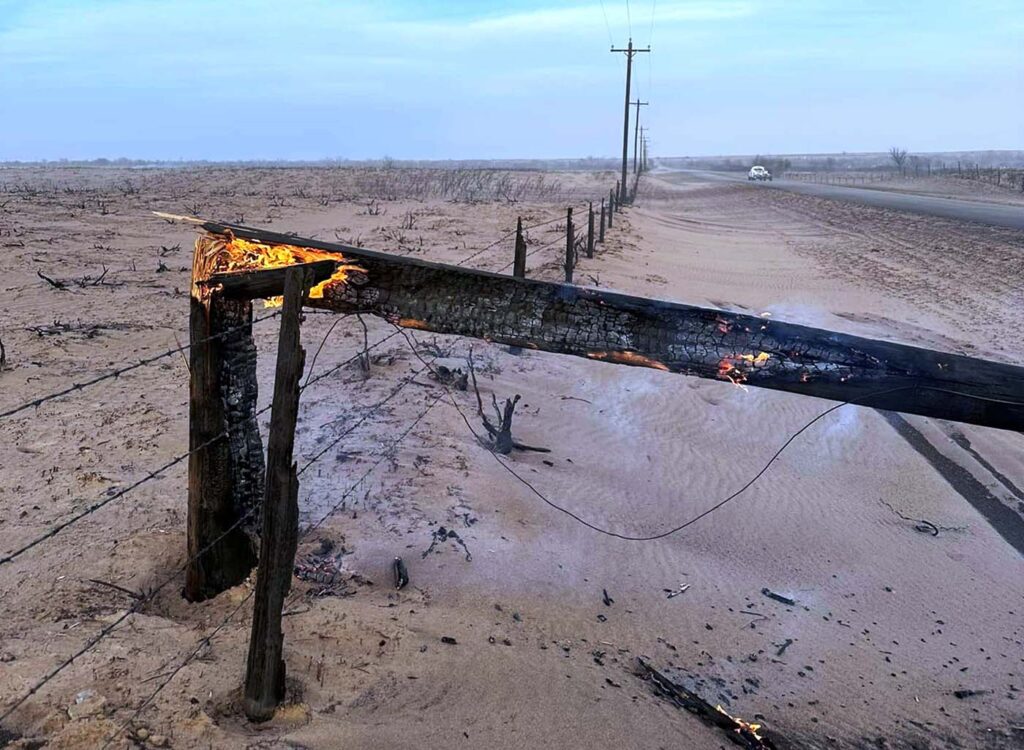
Uncontrolled wildfires in the Texas-Oklahoma panhandle scorched more than half-a-million acres, destroyed the homes of electric cooperative members and employees, and sent lineworkers into days-long repair work in some areas.
Texas Gov. Greg Abbott issued a disaster declaration Tuesday for 60 counties as the blazes remained largely uncontained. All crews from North Plains Electric Cooperative were working in Canadian, northeast of Amarillo, where the Smokehouse Creek fire essentially shuttered the small city of 2,200.
“Canadian was in the center of the devastation and we have heard reports of more than 30 homes being lost, including three cooperative employees,” said Randy Mahannah, general manager/vice president of North Plains Electric. He called restoration, especially in Canadian, “a huge task” that will likely require assistance from other cooperatives.
At peak, the fire affected nearly 3,000 of the 7,515 meters served by the Perryton, Texas-based co-op, with about 1,100 still without power as of midday Wednesday.
Across the Oklahoma border, Northwestern Electric Cooperative, headquartered in Woodward, dealt with the effects of wildfires mostly in sparsely populated Harper and Ellis counties.
Teams worked into the night on Tuesday and had most residential members back on by the Wednesday morning. Still, the fires took away several homes, including one of a co-op board member, as well as livestock.
Tyson Littau, CEO of Northwestern Electric, said the co-op is replacing about 100 poles in an area where a recent $100 million mitigation project had hardened the system and rebuilt 1,200 miles of line following a 2017 ice storm.
“When Mother Nature decides to put its wrath on the community, there’s really not much you can do,” he said.
Littau praised lineworkers who labored all night through smoke, fire, high winds and 10-degree temperatures to fix poles and inspect damaged and burned wire.
“These are some of the most miserable conditions,” he said. “To get a hot stick up in the air when the wind is blowing at 50 miles an hour—you almost need to get a bucket truck but the resources are scarce and you have linemen scattered all over.”
In Texas, Mahannah said high winds were to blame for a broken transmission pole near the community of Lipscomb that affected three substations while the fire limited access to work on circuits near Canadian and Glazier. Several major feeders had multiple poles on fire on Tuesday, he noted.
The fire burned all the unmounted poles at the co-op’s office in Canadian, said Bianca Peregrino, communications specialist at North Plains Electric. “It’s just a very messy, very unfortunate situation,” she said, adding that food stores in Canadian are closed because of the fire and accompanying damage.
Several co-ops took preventive steps to cope with the high winds and dry conditions. Tri-County Electric Cooperative, based in Hooker, Oklahoma, was among those setting transmission and distribution circuits to non-reclose to limit exposure to arc flashes if the power grid experienced a fault.
Steven Johnson is a contributing writer for NRECA.